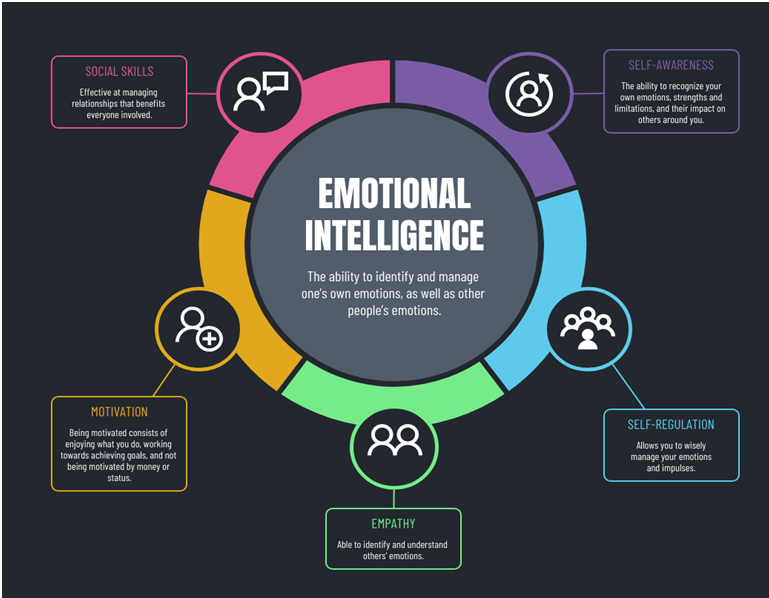The capacity to recognize, regulate, and effectively sense and react to the emotions of others is known as emotional intelligence or EQ. A student’s whole growth depends heavily on their emotional intelligence, which develops abilities that affect their relationships, academic achievement, and success in the future. It gives them the tools they need to successfully control their emotions, handle difficult circumstances, and triumph. This article explores the many advantages of emotional intelligence for students, emphasizing how it affects relationships, self-awareness, decision-making, and other areas.
What Is The Importance Of Emotional Intelligence In Education?
A variety of abilities are included in emotional intelligence, such as self-awareness, self-control, empathy, and social skills. It entails identifying and comprehending one’s own and other people’s emotions and then applying that knowledge to maneuver through diverse circumstances.
In the ever-evolving world of today, emotional intelligence in schooling is crucial. Pupils with strong emotional intelligence are more capable of managing the demands of both life and education. They flourish emotionally and socially in addition to academically.
What Are The Benefits Of Emotional Intelligence For Students?
While academic performance is unquestionably vital, a student’s overall success and well-being are greatly influenced by their emotional intelligence.

Source: linkedin.com
Let’s examine every advantage that emotional intelligence has for pupils:
Improved Self-Regulation And Self-Awareness
Students who possess emotional intelligence are highly aware of their motivations and feelings. They can identify their strengths and shortcomings because of their increased self-awareness, which helps them set reasonable objectives and make wise decisions.
Students are therefore more equipped to control their emotions and refrain from impulsive, unpredictable behavior that might harm their attempts.
Improved Relationships And Effective Communication
The ability to communicate clearly and effectively will benefit pupils for the rest of their lives. Students who possess emotional intelligence are better able to explain their thoughts clearly and with the right level of emotion.
It also aids in their comprehension of the motivations and feelings that underlie other people’s speech. As a result, they can forge stronger bonds with their family, instructors, and peers.
Enhanced Empathy For Conflict Resolution Skills
Although conflicts are unavoidable, emotionally intelligent students know how to handle them and create a peaceful atmosphere by using their skills in empathy, active listening, and compromise.
The foundation of emotional intelligence and conflict resolution is empathy, or the capacity to comprehend and experience another person’s feelings. Empathic students are more likely to build lasting relationships and settle disputes peacefully.
Anxiety And Stress Management
Stress and worry are frequently caused by the pressures of school and future employment in the fiercely competitive world of today.
With the aid of healthy coping strategies like deep breathing exercises, mindfulness practices, or joy-bringing activities, kids who possess emotional intelligence may effectively handle stress and preserve their mental health. As a result, students are more likely to overcome obstacles and keep a good attitude.
Decision-Making Abilities And Leadership
Effective communication, empathy, the capacity to motivate others, and the diplomatic handling of disagreement are all necessary for leadership. These traits are fostered by emotional intelligence, which equips students to lead with compassion and influence.
Since they take into account both emotional and cognitive elements, emotionally intelligent students also make excellent decisions that are in line with their beliefs and objectives.
Self-Confidence And Increased Empowerment
Students who master emotional intelligence feel more confident and empowered. Their confidence in their talents is bolstered by their thorough grasp of their strengths and abilities.
They are encouraged to take chances, look for new possibilities, and actively pursue their academic and personal goals as a result of this empowerment. As a result, pupils who possess higher emotional intelligence also typically have better self-images and higher levels of self-esteem.
Boosted Academic Performance
High emotional intelligence students frequently achieve academic success. Their emotional control enables them to respond to academic pressure in a composed, concentrated, and resilient manner. They are capable of setting realistic objectives, prioritizing work, and managing their time well.
Their improved social skills also make it possible for students to work with classmates, participate in productive debates, and ask for help when necessary, all of which contribute to a more engaging educational experience.
How To Harness The Benefits Of Emotional Intelligence?
Schools may include emotional intelligence into their curricula to help pupils benefit from it. Student emotional intelligence may be developed through group discussions, role-playing, and mindfulness exercises, among other things.
Prevent Bullying With Emotional Intelligence
Avoiding bullying is mostly dependent on having high emotional intelligence. Pupils with high emotional intelligence (EQ) are more inclined to step in and assist victims rather than participate in bullying behavior.
Role In Career Readiness
Emotional intelligence is a useful skill in the workplace. It improves abilities including communication, teamwork, and flexibility, which helps people lead effectively and succeed in their careers.
Grow Emotionally Rich Students
It takes work and self-awareness to build emotional intelligence. It may be developed by encouraging kids to consider their feelings, take part in exercises that develop empathy, and ask for help.
Implement Strategies To Promote Emotional Intelligence
Teachers may foster emotional intelligence by establishing a welcoming and inclusive learning atmosphere in the classroom. Effective tactics include including emotional literacy education, promoting candid communication, and setting an example of EQ behavior.
Build Emotionally Intelligent Students
For students, emotional intelligence is a vital tool that influences their relationships, academic performance, and personal development. Students are better equipped to face obstacles in life and make valuable contributions to society when they acquire competencies like self-awareness, empathy, and effective communication. Thus, you as teachers must equip yourselves with offline or online teacher training courses in Bangalore to be aware of the required strategies and cater to every student’s needs.



